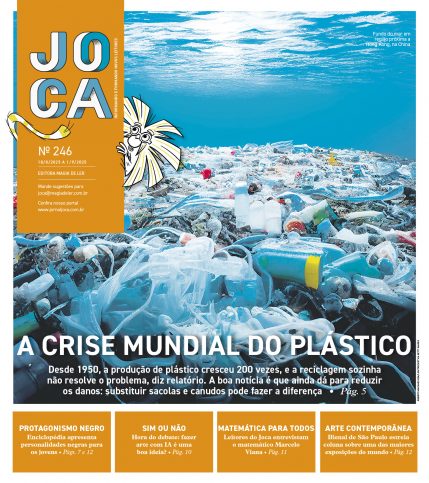Edições Impressas
22 de agosto de 2025
World | Plastic production has grown by over 200%, study says – Level 2
Article published on Joca 246

A report published on August 3 in the scientific journal The Lancet showed that humanity has increased plastic production by over 200 times since 1950. The study also indicated that the material is causing harm to human health and the environment.
When fully synthetic plastic was created around 1907, a series of problems were solved. Thanks to it, consumer goods became cheaper, and the industry grew. However, because it does not decompose easily in nature, the production of the material has become increasingly harmful.
To give you an idea, it is estimated that the first manufactured plastics are still around. Also, over 98% of plastics are derived from fossil fuels, such as oil and coal, emitting the equivalent of one billion tons of carbon dioxide (CO2) into the atmosphere each year—a gas that is one of the main contributors to the greenhouse effect.
According to the authors of the report, while recycling is important, it won’t be enough to solve the problem. “It is now clear that the world cannot recycle its way out of the plastic pollution crisis”, the text states. In other words, it’s necessary to reduce consumption and opt for alternatives, such as recyclable bags and paper straws.
The Largest Producers and Brazil
China is the largest producer of plastic, accounting for a third of global production. The United States and Saudi Arabia follow, according to 2024 data from the British environmental consultancy Eunomia and the research group Zero Carbon Analytics.
In 2022, production in Brazil reached 13.7 million tons, an average of 64 kilograms per person per year, according to research by the Brazilian Association of Public Cleaning and Special Waste Companies. According to the institution, more than 3 million tons of solid waste end up in rivers and seas every year, enough to cover over 7,000 soccer fields.
The Threat in Numbers
200 times is how much plastic production has increased worldwide since 1950
7.8 trillion reais this is the damage caused by the impacts on health and the environment
1 billion tons per year this is the estimated global production in 2060
Less than 10% ff all plastic produced is recycled
Sources: The Lancet and Galileu
Greenhouse effect: a phenomenon that warms the planet, but which is intensified by polluting gases, such as carbon dioxide (CO2). When released, these gases rise into the atmosphere and are “trapped” there, accumulating in a kind of layer that prevents heat from escaping the Earth.
Ixi! Você bateu no paywall!
Ainda não é assinante? Assine agora e tenha acesso ilimitado ao conteúdo do Joca.











Você precisa fazer o login para publicar um comentário.